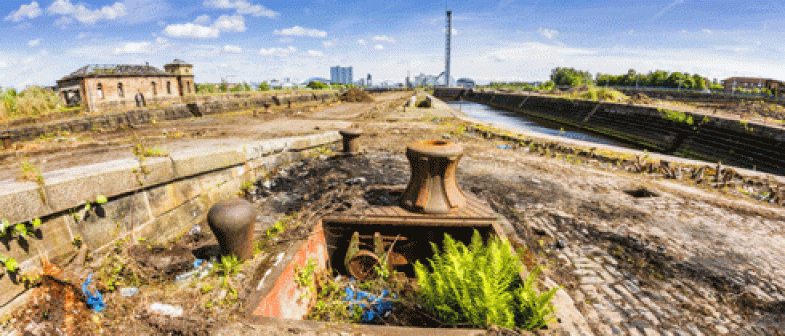
The University of Glasgow, in partnership with Glasgow City Council, are working on a £10.2 million research programme: Glasgow as a Living Lab Accelerating Novel Transformation (GALLANT).
Funded by UKRI NERC as part of their Changing the Environment investment, the University of Glasgow’s researchers are helping the city move towards climate resilience whilst tackling health, social and economic inequalities.
GALLANT will use Glasgow as a living lab to trial new sustainable solutions throughout the city. GALLANT takes a whole-systems approach: while addressing the city’s key environmental challenges, the programme will consider the co-benefits and trade-offs for public health, wellbeing, and the economy. GALLANT aims to deliver the social priorities of the UN Sustainable Development Goals while remaining within the planetary boundaries of a 1.5°C world - using doughnut economics as a framework.
GALLANT started in January 2022 under the leadership of Centre for Sustainable Solutions Director, Professor Jaime Toney, and in collaboration with 29 key programme partners from a variety of public bodies, community groups and businesses.
The Glasgow team will build on existing inter-disciplinary academic collaborations, and develop new ones, as well as new ways of working to suit these urgent challenges, with over 50 researchers from across their schools, colleges and institutes, and ten exciting PhD projects.
"Together we aim not only to bring nature back into the city system, but make meaningful, lasting change that embeds sustainability across major policy decisions and empowers communities as stewards of their local places”, explains Professor Toney. “GALLANT will work with local partners and communities to transform the city into a thriving place for people and nature. It will help Glasgow achieve its goal to be carbon neutral by 2030 and accelerate its path to climate resilience."
The aim of this research partnership is to boost Glasgow's transition to climate resilience through:
- Designing, implementing and testing a translatable whole-system approach to urban environmental and wellbeing challenges to deliver the social priorities of the UN Sustainable Development Goals, while remaining within the ecological ceiling defined by the planetary boundaries of a 1.5C world, and
- Working with partners and local communities to co-produce and deliver five interdependent, mutually reinforcing environmental solutions for climate resilience that build capacity for ongoing innovation in the Glasgow living lab.
The five solutions are:
- To address flood risk related to tidal changes, sea level rise, and increased water from extreme weather events. GALLANT aims to transform land use along the River Clyde by identifying sites for urban corridor parks for flood water storage, while also improving areas along the Clyde for wildlife and people.
- To halt biodiversity loss by restoring and connecting currently isolated habitat patches. GALLANT will improve biodiversity by restoring and connecting habitats across Glasgow. Citizens will play a key role in helping researchers to map important bird and mammal species that lead to new management practices in greenspaces to increase connectivity between habitats.
- To trial new ways of regenerating derelict and polluted land through technology that mineralises greenhouse gases and traps organic pollutants into building materials for the future, as well as returning these sites for community use and ecologically functional places.
- To enhance the connectivity that is important not only for nature, but for active travel and inclusive mobility. GALLANT will work with communities to increase active travel including cycling, wheeling and walking to reduce car journeys, improve air quality and reduce carbon dioxide emissions.
- To tackle sustainable energy as a key challenge to achieving net zero carbon. GALLANT will develop sustainable low carbon energy solutions at the community scale that empower local people as active energy citizens to co-create clean energy demand.
Through the living lab approach, researchers will learn how to create solutions that are place-based and meaningful to local people. Glasgow’s global network of partners means that they will exchange learning and solutions with both academics and policy leaders across the world. This is an exciting opportunity for Glasgow to lead and carry on the legacy from the recent COP26.















